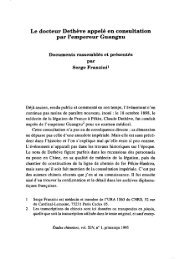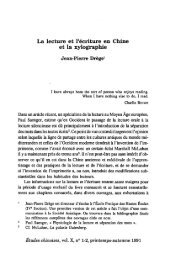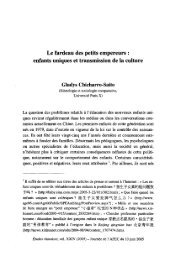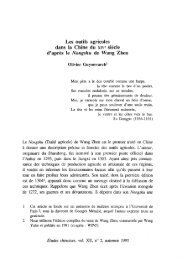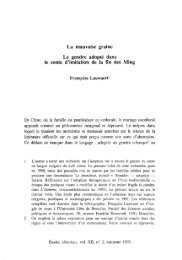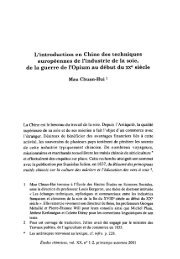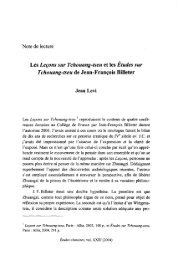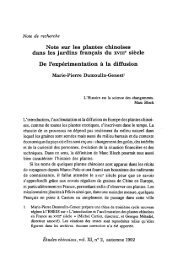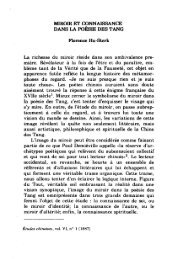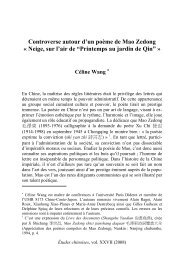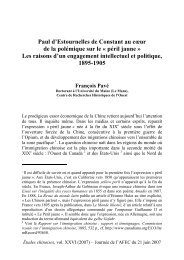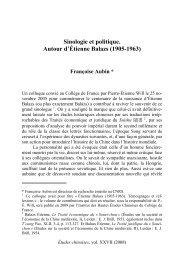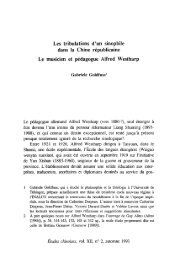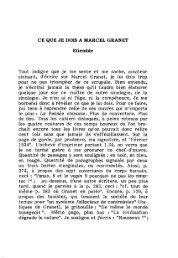- Page 1 and 2:
COMPTES RENDUS Michael Loewe, A Bio
- Page 3 and 4:
Comptes rendus gouverneurs connus,
- Page 5 and 6:
Comptes rendus tous les Conseillers
- Page 7 and 8:
Comptes rendus apparues brusquement
- Page 9 and 10:
Comptes rendus L'ouvrage est divis
- Page 11 and 12:
Comptes rendus est impossible de r
- Page 13 and 14:
Comptes rendus de ne pas mettre en
- Page 15 and 16:
Comptes rendus 1035, ce qui en a fa
- Page 17 and 18:
Comptes rendus nés de Dunhuang, en
- Page 19 and 20:
Comptes rendus pharmacology in méd
- Page 21 and 22:
Comptes rendus crises between 1022
- Page 23 and 24:
Comptes rendus guish between what a
- Page 25 and 26:
Comptes rendus L'introduction, rema
- Page 27 and 28:
Comptes rendus renforcer le gouvern
- Page 29 and 30:
Comptes rendus side dans le systèm
- Page 31 and 32:
Comptes rendus Stephen Eskildsen, T
- Page 33 and 34:
Comptes rendus Chan (il mentionne d
- Page 35 and 36:
Comptes rendus mais il ignore les a
- Page 37 and 38:
Comptes rendus mie féminine). Mais
- Page 39 and 40:
Comptes rendus given the diversity
- Page 41 and 42:
Comptes rendus quest, the most deva
- Page 43 and 44:
Comptes rendus lesser or a greater
- Page 45 and 46:
Comptes rendus and he doesn't. This
- Page 47 and 48:
Comptes rendus traduction de Jiang
- Page 49 and 50:
Comptes rendus essentiels pour son
- Page 51 and 52:
Comptes rendus un moment pour s'acc
- Page 53 and 54:
Comptes rendus Claudine Salmon et R
- Page 55 and 56:
Comptes rendus liter une expansion
- Page 57 and 58:
Comptes rendus du maintien en usage
- Page 59 and 60:
Comptes rendus frée de la producti
- Page 61 and 62:
Comptes rendus d'impression étant
- Page 63 and 64:
Comptes rendus locale précédente
- Page 65 and 66:
Comptes rendus fications plus l'aut
- Page 67 and 68:
Comptes rendus S'il s'agit de l'opi
- Page 69 and 70:
Comptes rendus Pékin en 1575 (dans
- Page 71 and 72:
Comptes rendus The Western Concept
- Page 73 and 74:
Comptes rendus brables textes funé
- Page 75 and 76:
Comptes rendus vidu, ils étaient b
- Page 77 and 78:
Comptes rendus ming ? Si Clunas sou
- Page 79 and 80:
Comptes rendus une marque de fabriq
- Page 81 and 82:
Comptes rendus world (a perhaps deb
- Page 83 and 84:
Comptes rendus account the spread o
- Page 85 and 86:
Comptes rendus unwilling to advance
- Page 87 and 88:
Comptes rendus came about that in t
- Page 89 and 90:
Comptes rendus Suzhou we hâve insu
- Page 91 and 92:
Comptes rendus l'auteur se présent
- Page 93 and 94:
Comptes rendus S'agit-il d'une visi
- Page 95 and 96:
Comptes rendus Il apparaît diffici
- Page 97 and 98:
Comptes rendus parler d'un « xushu
- Page 99 and 100:
Comptes rendus « froid » au fond
- Page 101 and 102:
Comptes rendus sulfureux prédéces
- Page 103 and 104:
Comptes rendus Cette dernière œuv
- Page 105 and 106:
Comptes rendus Si éloignée que so
- Page 107 and 108:
Comptes rendus roman chinois : cell
- Page 109 and 110:
Comptes rendus raisons, et l'auteur
- Page 111 and 112:
Comptes rendus reuses constantes et
- Page 113 and 114:
Comptes rendus tées et annotées p
- Page 115 and 116:
Comptes rendus siècle, il y a enco
- Page 117 and 118:
Comptes rendus telle autre ? Cette
- Page 119 and 120:
Comptes rendus longueur des pièces
- Page 121 and 122:
Comptes rendus l'attention de Wanli
- Page 123 and 124: Comptes rendus peut que regretter q
- Page 125 and 126: Comptes rendus concluait qu'en tout
- Page 127 and 128: Comptes rendus modité provient si
- Page 129 and 130: Comptes rendus étaient multiples.
- Page 131 and 132: Comptes rendus consacrée), etc. On
- Page 133 and 134: Comptes rendus té du processus xyl
- Page 135 and 136: Comptes rendus exemple le mémoire
- Page 137 and 138: Comptes rendus Most of the other co
- Page 139 and 140: Comptes rendus substantiates a chan
- Page 141 and 142: Comptes rendus their senders about
- Page 143 and 144: Comptes rendus in its wake various
- Page 145 and 146: Comptes rendus ance, but the main f
- Page 147 and 148: Comptes rendus thinkers in gênerai
- Page 149 and 150: Comptes rendus ors on female chasti
- Page 151 and 152: Comptes rendus port patriarchal aut
- Page 153 and 154: Comptes rendus La première traite
- Page 155 and 156: Comptes rendus cine et la renaissan
- Page 157 and 158: Comptes rendus En résumé, On Thei
- Page 159 and 160: Comptes rendus The book begins with
- Page 161 and 162: Comptes rendus Galdan's ancestors."
- Page 163 and 164: Comptes rendus that would hâve bee
- Page 165 and 166: Comptes rendus paying for the new t
- Page 167 and 168: Comptes rendus what exactly is comi
- Page 169 and 170: Comptes rendus rencontre avec les a
- Page 171 and 172: Comptes rendus Sud en son essence q
- Page 173: Comptes rendus Thoralf Klein, Reinh
- Page 177 and 178: Comptes rendus White Masks (the tit
- Page 179 and 180: Comptes rendus nothing of "China,"
- Page 181 and 182: Comptes rendus in Liu's view, and a
- Page 183 and 184: Comptes rendus 6 Incidentally, the
- Page 185 and 186: Comptes rendus analyses mesurées d
- Page 187 and 188: Comptes rendus priété de Li Sheng
- Page 189 and 190: Comptes rendus 2 G. Lehner, Der Dru
- Page 191 and 192: Comptes rendus offertes, mais aussi
- Page 193 and 194: Comptes rendus qui séjournait depu
- Page 195 and 196: Comptes rendus (l'amour) comme un s
- Page 197 and 198: Comptes rendus avait remédié en 1
- Page 199 and 200: Comptes rendus Résultat de recherc
- Page 201 and 202: Comptes rendus 1911, les auteurs af
- Page 203 and 204: Comptes rendus longue durée. Surto
- Page 205 and 206: Comptes rendus fondamental pour le
- Page 207 and 208: Comptes rendus 1951 (Berkeley : Uni
- Page 209 and 210: Comptes rendus tibétain, en dépit
- Page 211 and 212: Comptes rendus humbles. D'une faço
- Page 213 and 214: Comptes rendus Thèse arguments are
- Page 215 and 216: Comptes rendus lights the continuit
- Page 217 and 218: Comptes rendus l'auteur d'ajouter d
- Page 219 and 220: Comptes rendus utiliser en vue de l
- Page 221 and 222: Comptes rendus La revue NUsheng ix3
- Page 223 and 224: Comptes rendus langue chinoise et e
- Page 225 and 226:
Comptes rendus des maîtres charism
- Page 227 and 228:
Comptes rendus temps des études de
- Page 229 and 230:
Comptes rendus la production. Elles
- Page 231 and 232:
Comptes rendus Hong Kong dans le d
- Page 233 and 234:
Comptes rendus une « minorité eth
- Page 235 and 236:
Comptes rendus a été un échec. C
- Page 237 and 238:
Comptes rendus région. Linda Benso
- Page 239 and 240:
Comptes rendus L'ouvrage est divis
- Page 241 and 242:
Comptes rendus la montée de la rh
- Page 243 and 244:
Comptes rendus des savoirs construc
- Page 245 and 246:
Comptes rendus complémentarité. L
- Page 247 and 248:
Comptes rendus Ralph D. Sawyer, Fir
- Page 249 and 250:
Comptes rendus reprenant les mêmes
- Page 251 and 252:
Comptes rendus de flèches et fusé
- Page 253 and 254:
Comptes rendus Pour contrer cette t
- Page 255 and 256:
Comptes rendus Ils sont encore ment
- Page 257 and 258:
Comptes rendus 1 Voir le compte ren
- Page 259 and 260:
Comptes rendus ments. L'auteur insi
- Page 261 and 262:
Comptes rendus L'auteur insiste sur
- Page 263 and 264:
Comptes rendus Mais cette terre pro
- Page 265 and 266:
Comptes rendus pré-impériale et i
- Page 267 and 268:
Comptes rendus trop nombreuses (on
- Page 269 and 270:
Comptes rendus auteurs et les six m
- Page 271 and 272:
Comptes rendus pour laquelle il est
- Page 273 and 274:
Comptes rendus tallurgiques des Sha
- Page 275 and 276:
Comptes rendus Sur le plan de la te
- Page 277 and 278:
Comptes rendus Xue Yibin ou Zhang Z
- Page 279 and 280:
Comptes rendus Dans le dernier chap
- Page 281 and 282:
Comptes rendus le regard des écriv
- Page 283 and 284:
Comptes rendus nées 1980 et en s'i



